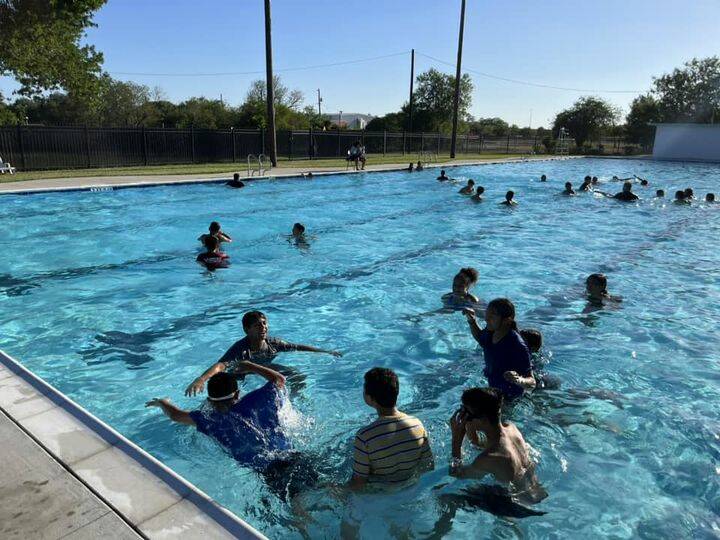|
Only have a minute? Listen instead
Getting your Trinity Audio player ready...
|

HARLINGEN — “Get water.”
The band students rushed toward their bottles in the hot morning sun and consumed great quantities of water before returning to their instruments.
The kids at the Boys and Girls Clubs of Harlingen, always a robust and gregarious bunch eager for the outdoors, spent more time inside their facilities this summer to avoid heat injuries.
And those injuries pose a greater hazard than anyone can ever recall. With temperatures consistently slipping into the 100s, this summer is the hottest on record, said Barry Goldsmith, warning coordination meteorologist at the US National Weather Service in Brownsville.
“From the start of the hot pattern on June 9 until the end of July, all long-term Valley locations ranked among the three hottest on record,” Goldsmith said. “Should August follow June and July’s lead, the three-month period has a chance to rank first across the Valley, ahead of 1998.”
Goldsmith made this statement around the first of August, and the temperatures have indeed been consistently high.
That’s why Adam Benzing, emergency physician at Valley Baptist Medical Center, is urging people to drink more water more often than they ever have.
“I think that most people generally don’t appreciate the need to stay hydrated,” he said. “They need to plan ahead to stay hydrated. Once you’re thirsty, you are already dehydrated. So, part of staying hydrated is planning ahead, and that means hydrating the night before. Hydrate yourself before putting yourself out there in the heat and before you’re exerting yourself.”
Benzing said that fortunately he has yet to see any cases of heat stroke, but he has seen some heat exhaustion and heat syncope.
Heat syncope, he explained, occurs when someone who is dehydrated stands up and feels dizzy or has a fainting spell.
“It’s essentially a body’s inability to compensate, to move blood around when they stand up quickly,” he said.
He has also seen a case of acute renal failure which was caused by dehydration, and the patient didn’t have any preexisting conditions.
“It was a young otherwise healthy man who works outside a lot, and he was pretty severely dehydrated for a couple of days,” Benzing said.
“Drinking water is probably one of the most important things,” he said.
The problem of heat injuries is caused not only by a day being hot but by a long line of continuous hot days, which can put a cumulative amount of stress on the body.
Goldsmith explained in depth the long line of hot days beginning in June. He did this by first explaining the yearly occurrence of La Canicula or the Dog Days of Summer. Historically, La Canicula has been timed with the rising of the star system Sirius each morning with the sun. This yearly phenomenon usually takes place between July 3 and Aug. 11.
“With that we often get a pattern that is hot and humid but rain free or generally rain free,” Goldsmith said. “So, to have Canicula between July 3 and Aug. 11 isn’t all that unusual.”
What happened this summer was anything but usual, Goldsmith said. On June 9 there was a shift in weather patterns; by June 12 the heat had kicked into the upper registers.
“We really haven’t gotten out of it aside from a couple of days right after the Fourth of July,” Goldsmith said. “So, we’re looking at 60 days give or take with a canicular pattern versus the average which is about 40 days. That’s the big reason we have been so hot for so long.”
And those unbroken succession of hot days has exacerbated an already difficult situation, Benzing said.
“Heat puts stress on the body, and that stress day after day after day slowly wears the body down,” Benzing said. “What’s important is for the body to be able to compensate from day to day by having that period of time at night to be able to cool off and recover and recuperate.”
This means having cool spaces at night in which to rest and rejuvenate from the heat, which is particularly problematic for the homeless and for those who don’t have air conditioning.
“They run a much higher risk of developing heat illness with the more consecutive hot days that we have,” Benzing said. “This is partly why heat, when you have major bouts of heat, that’s actually one of the most dangerous and deadly disasters, more than tornadoes, more than hurricanes, more than earthquakes.”
However, while planning our lives around staying hydrated and cooling down our bodies, it is also important to let your body acclimate to a hotter environment.
“We need to some degree to spend time in the heat in order to acclimate and adjust to it as well,” Benzing said. “When you hide from the heat and you’re spending most of your time in air conditioning, then you’re also not giving your body time to properly acclimate. Spending all that time inside and then suddenly going outside and exerting ourselves, you’re going to be more prone to having an acute heat injury.”



